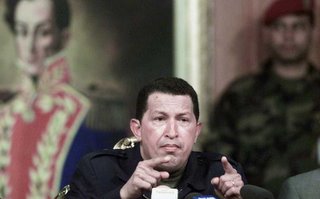The Big Blowup Over Venezuela

The Big Blowup Over Venezuela
A Dig led by Marc Cooper
Marc Cooper is a contributing editor to The Nation and a senior fellow at the USC Annenberg Institute for Justice and Journalism. His book “Pinochet and Me,” a memoir of his days as translator for Chilean President Salvador Allende, was a Los Angeles Times bestseller.
Is Venezuelan President Hugo Chavez, leader of his “Bolivarian Revolution,” an authentic liberator whose program of “distributive social justice” can effectively blend socialism and democracy and uplift the poor? Or is he, as his enemies (including the Bush administration) allege, just another anti-democratic populist demagogue, a human rights violator obsessed with personal power? The answers are complicated and nuanced and probably satisfy nobody.
Those questions, at least, were certainly on vivid display when the nearly three dozen nations of the Americas met in Argentina in November at their latest hemispheric summit. All of a sudden, it seemed like déja vu all over again. Here we were, back to the chilly days of the Cold War, with Uncle Sam facing off against a challenging and obstreperous leftist--a self-proclaimed socialist, no less--claiming to speak on behalf of his overshadowed and impoverished continent and enthusiastically thumbing his nose at Yankee imperialism.
The assembled press had only one story in mind: just how big a confrontation would be produced between George W. Bush and twice- (some would say thrice-) elected Hugo Chavez. After a half-decade of unremitting hostility between Washington and Caracas, the dramatic stage had been more than set.
Indeed, the U.S. enmity toward Chavez even transcended the staunch partisan lines that have marked the Bush era. During his 2004 presidential campaign, Democratic candidate John Kerry briefly made the Venezuelan leader an issue, calling him a supporter of “narco-terrorists” and “detrimental to our interests.”
This past August, televangelist and conservative political activist Pat Robertson openly called for the assassination of Chavez. “If he thinks we’re trying to assassinate him,” Robertson said, “I think we really ought to go ahead and do it.”
Most recently, U.S. Secretary of Defense Donald Rumsfeld called Chavez’s friendship with Fidel Castro’s Cuba a “menace” to the region--the sort of language that gives any Third World leader contemplating American military power some restless nights. And in Venezuela’s case there is this added factor: The U.S. receives a full sixth of its oil imports from the South American country, making it economically strategic. (Some 13,000 Citgo gas stations in the U.S. are a direct arm of Venezuela’s state-run oil company.)
Washington’s threats were so ominous, by Chavez’s interpretation, that weeks before the Argentine summit he said he had been forced to cancel numerous public appearances to guarantee his safety. He also called for the creation of a civilian militia that would force any invading American troops to “bite the dust.” And he warned that if the Americans invade, “you can forget the Venezuelan oil.”
Chavez then escalated the rhetorical fire, branding the Bush White House “a terrorist administration” and calling the U.S. president no less than a “murderer."
Shattering the “Washington Consensus"
Those seeking the standoff at the Summit of the Americas were not disappointed. Though personal fireworks between Bush and Chavez were avoided, the policy clash was thunderous. The five biggest economic powers in Latin America, led in good part by Chavez, handed the Bush administration a thudding defeat, turning thumbs down on the U.S. blueprint for a Free Trade Area of the Americas (FTAA).
Upon conclusion of the summit, with the American diplomatic push a smoking train wreck, Chavez was jubilant: “The great loser today was George W. Bush. The man went away wounded. You could see defeat on his face.” Chavez said he felt “the taste of victory” and that the FTAA had been “buried.” Chavez urged the other Latin American presidents to join the fight against the FTAA.
Particularly worrisome to the conservative Bush administration was that Chavez was only the most jagged edge of a mounting trend of left-of-center leaders coming to power in Latin America: President Luiz Inᣩo Lula da Silva in Brazil, President Néstor Kirchner in Argentina and President Tabare Vasquez in Uruguay. A moderate socialist-led coalition was also in power in Chile. And a more radical movement was gaining popularity in Bolivia and its leader, Evo Morales, was increasingly considered a presidential contender.
To the conservatives who dominate the Bush policy apparatus, this was a new “Red Dawn” in the making. A continent which had been all but abandoned by the administration was now being refocused through a resurrected Cold War optic. And the cross hairs were on Chavez, who--to many--was the New Castro: a radical, demagogic dictator-in-the-making intent on sabotaging democracy, freedom and American interests.
But to others on the continent and beyond, Chavez was a bracing and bold alternative to the packet of United States-backed policies that had come to be known as the Washington Consensus: free enterprise, free trade, a rollback of the state and social services, a sort of trickle-down economics for export. To his admirers and supporters, Chavez was a leader who had the courage to stand up to the United States. He openly denounced American-backed policies that had failed to alleviate the injustices lacerating Latin America, and he implemented tangible alternative policies that were visibly aiding the poor and the forgotten.
All of this leaves outside observers to ask which version of events is true, or at least closer to the truth.
Let’s do some digging:
Continued: The Making of a Radical
1 2 3 4 NEXT PAGE >>>
Link Here




0 Comments:
Post a Comment
<< Home